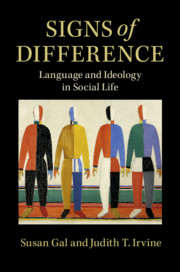Introduction
Published online by Cambridge University Press: 17 June 2019
Summary
The book asks how we should understand differentiation in language and communication within a world of human social relations and action. Attending to processes of fission and fusion that create and organize difference, the argument details how people conceive of difference as a process and work with it. Ideological process engages difference, both pervading and informing social action of all kinds. Neither true nor false, ideologies are positioned and partial visions of the world, relying on comparison and perspective-taking, and establishing a regime of value. Inspired by Peirce, we show ideological work to be semiotically constituted. It is open-ended and creative, embracing communication, linguistic and otherwise. We offer a multipart semiotic approach to the ideologized processes organizing and construing fission and fusion. Central concepts are attention-focusing, contrast, rhematization, axis of differentiation, fractal recursivity, and erasure. The book also presents analytical strategies, in a tradition of comparison in anthropology. There is no qualitative gulf between researchers and participants: all social actors must seek to interpret, and act upon, semiotic forms.
- Type
- Chapter
- Information
- Signs of DifferenceLanguage and Ideology in Social Life, pp. 1 - 26Publisher: Cambridge University PressPrint publication year: 2019



